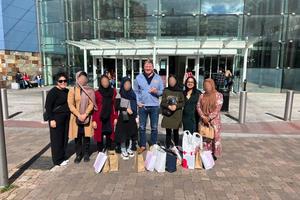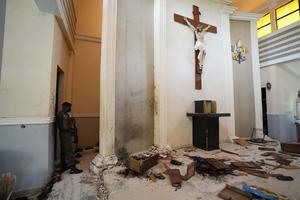‘Let Nothing Disturb You’ — Syrian Priest and Former ISIS Hostage Finds Hope
Father Jacques Mourad, kidnapped by the Islamic State in 2015 and detained for several months, tells how prayer erased his fear of death and gave him the strength to never give up on dialogue with his jailers.

Father Jacques Mourad spent five months in the jails of Islamic State militants, in constant danger of death. One day after the Palmyra offensive, May 21, 2015, as the Syrian civil war had been raging for four years, Father Mourad, superior of the monastery of Mar Elian in Al-Qaryatayn, was kidnapped with a deacon of his community by two Islamic terrorists, one of whom he knew. The jihadists abruptly stormed into the convent in the middle of the day and dragged them to the back of a car, where they were locked up for four days, until they reached Raqqa, the ISIS-proclaimed capital of the Islamic State.
This is how his long ordeal began.
The Light of God in the Darkness
During his months of captivity, Father Mourad underwent all sorts of abuse. Confined in a dark and gloomy bathroom without electricity, insulted, whipped, repeatedly threatened with beheading and urged to convert to Islam, he saw the specter of death becoming more concrete and inevitable day after day.
Initially convinced not to be worthy of martyrdom, Father found the spiritual resources to face his destiny in St. Teresa of Ávila — praying every night her famous prayer of abandonment “Let nothing disturb you” — and in Our Lady of Lourdes, to whom he made a pilgrimage after he was released.
“Every time I prayed the Rosary, the Virgin Mary gave me peace,” Mourad told the Register on the occasion of the presentation of his recent book Un Monaco in ostaggio: La lotta per la pace di un prigioniero dei jihadisti (A Monk Held Hostage: A Jihadist Prisoner’s Struggle for Peace) at the parish church of the Santissimo Salvatore in Bracciano, near Rome, on Feb. 8. “Her presence gave me a lot of support and helped me overcome my fear of death, which is a natural feeling — no one wants to lose one’s life.”
“But as St. Paul once said,” he added, “death is beautiful because it brings [us] to Christ, and this sentence is so engraved in my heart that I can even say it saved me.”
When the jihadists brought him back to Al-Qaryatayn, together with some of his parishioners who also were held as hostages, Father Mourad eventually managed to miraculously escape, thanks to a few Muslim friends masquerading as one of them.
As he revealed in his book, this authentic trip to hell, during which he initially felt nothing but fear and anger, slowly became a “kind of spiritual retreat that would change me forever.” As peace returned to Father Mourad’s heart, he came to pity his jailers, who were “free to come and go but that seemed to be immured in an interior prison that was far gloomier than my bathroom,” he wrote.
Promise of Return
He now lives beside the refugees in Sulaymaniyah, in the northeast of Iraq, and cherishes the hope of one day rebuilding his monastery of Mar Elian, a 1,500-year-old jewel of the Christian heritage, named for St. Elian (in Syriac, “Mar Elian”) of Emesa, the fifth-century Syriac martyr, that was entirely destroyed by ISIS in August 2015. Before its destruction, the monastery was noted as a center for Christian-Islamic dialogue.
“The bones of Mar Elian weren’t damaged in the explosion, and it is a proof that God wants the bones stay in this place so that this site remains a place of unity, a place of gathering and prayer for everybody,” Father Mourad told the Register, noting that even if no reopening project has been officially initiated yet, he hopes he can count on the spiritual and financial support from associations and friends in the future.
At the moment, there are no Christians left in Al-Qaryatayn, the city adjoining the convent. Since it was liberated by the Syrian Army in 2017, the desolate town has been struggling to come back to life. “All of the Christians left because it is still impossible for them to live there, but I still trust God and his providence,” Father Mourad said, reaffirming his belief that he has been called to rebuild the Lord’s Church in the Syrian desert. “I know that God wants his Church to survive, as he said that even the doors of hell cannot destroy it. Thus, I count on this promise, and I move on.”
The Long Path of Dialogue
It is with the same spirit of a cathedral builder that Father Mourad, originally from Aleppo, joined the monastic community of Deir Mar Musa in his youth to live in the desert among the Muslims. Founded in the 1980s by the Roman Jesuit Father Paolo Dall’Oglio (who disappeared in Raqqa in 2013), this community draws its spirituality from the life of Blessed Charles de Foucauld, who lived as a hermit in North Africa among the Tuaregs.
By actively promoting interreligious dialogue with Muslims, Father Mourad has also been willing to play the role of a whistleblower about shortcoming in this area to the Christian world, especially in the West. “The Eastern Christians didn’t grant enough importance to dialogue in the past, and we paid a heavy price,” he said.
While conceding intrinsic difficulties of entering into dialogue with Muslims in a Middle Eastern context, where Christians bear the trauma of a long history of persecution, Father Mourad is convinced that a phenomenon like ISIS could have been at least locally contained if a more systematic and deep theological dialogue had been implemented 30 years earlier. He admits he initially didn’t believe in interfaith dialogue with Muslims himself, having a hard time understanding Father Dall’Oglio’s spiritual vision, but his experience first at Mar Moussa and then at Mar Elian, where the community organized common think tanks with Muslim communities, eventually showed him that “everything is possible if the people involved are people of goodwill.”
And his dreadful experience as a hostage of ISIS — during which God was the only topic that enabled him to make a connection and then dialogue with his radical Islamic jailers — has only strengthened his conviction that religion remains the best tool to promote a more genuine peace.
“During the first weeks, discussion was totally impossible with my jailers,” he recalled in his remarks at his book presentation. “When they started questioning me about my beliefs, they were extremely agressive and laughed at me, but they kept asking me questions; and in the end, we could establish a proper dialogue. Faith was the only channel through which I could make a connection with them.”
The advance of political Islam in the West, especially in Europe, makes him feel the urgent need for the Church to propose the right model of dialogue and integration to the Muslim newcomers, without which there cannot be any decent future for anyone.
“This is why I want to testify today, to waken the quiescent consciences, before it is too late,” he told the Register. “This is why I insist so much on the importance of the Christian testimony.”
Conversion Takes Time
But dialogue requires time, Father Mourad said. “We must encourage the conversion of Muslims, but it cannot happen all of a sudden,” he told the Register, “with everyone becoming Christian and getting baptized — conversion doesn’t happen this way.”
Such a conversion, he added, begins with the conversion of hearts, which can only happen through “spiritual life, by dedicating one’s life to the Muslim’s world, and invite them to join us in prayer.”
Solène Tadié is the Register’s Rome-based Europe correspondent.
- Keywords:
- isis
- kidnapped priests
- solène tadié

















